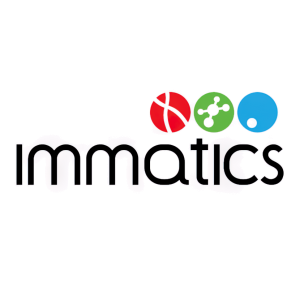Immatics Presents Clinical Proof-of-Concept Data from Ongoing Phase 1 Dose Escalation Trial with TCR Bispecific Molecule TCER® IMA401 Targeting MAGEA4/8 at ESMO 2024 and Provides Development Update
Rhea-AI Summary
Immatics presented clinical proof-of-concept data for its TCER® IMA401 targeting MAGEA4/8 at ESMO 2024. The Phase 1 dose escalation trial showed initial anti-tumor activity and a manageable tolerability profile in heavily pre-treated patients with various solid tumors. Key findings include:
- Objective response rate (ORR) of 29% and disease control rate (DCR) of 53% in the efficacy population
- Durable responses lasting up to 13+ months
- Median terminal half-life of over two weeks, supporting q2w dosing
- Manageable safety profile with transient lymphopenia and mild to moderate CRS as most frequent treatment-related AEs
Immatics will regain full rights to IMA401 as Bristol Myers Squibb ends collaboration due to portfolio prioritization. The company plans to advance IMA401 further, with the next data update expected in 2025.
Positive
- Initial anti-tumor activity observed with 29% ORR and 53% DCR in efficacy population
- Durable responses lasting up to 13+ months in some patients
- Manageable tolerability profile with transient and expected adverse events
- Extended median half-life of over two weeks, supporting less frequent dosing
- Immatics regains full rights to IMA401, allowing for independent development
- No refund of $150 million upfront payment required from Bristol Myers Squibb collaboration
Negative
- Bristol Myers Squibb ending collaboration due to portfolio prioritization
- Maximum tolerated dose not yet determined, dose escalation ongoing
- efficacy data with small patient population (17 patients at relevant dose and target levels)
News Market Reaction
On the day this news was published, IMTX gained 0.39%, reflecting a mild positive market reaction.
Data tracked by StockTitan Argus on the day of publication.
- TCER® IMA401 is a novel, next-generation, half-life extended bispecific T cell engager directed against an HLA-A*02-presented peptide derived from MAGEA4 and MAGEA8 with high target copy numbers on various solid cancers
- Data from the first-in-human Phase 1 dose escalation trial demonstrate initial anti-tumor activity and a manageable tolerability profile for TCER® IMA401 monotherapy; patient population includes 35 heavily pre-treated patients across 16 different solid tumor types; dose escalation is ongoing
- Objective response rate (ORR)
29% , confirmed ORR (cORR)25% , disease control rate (DCR) of53% and tumor shrinkage rate of53% in the efficacy population treated with relevant IMA401 doses and MAGEA4/8 target levels1 - Objective responses observed in head and neck squamous cell carcinoma, neuroendocrine tumor, cutaneous and mucosal melanoma including durable ongoing partial responses of up to 13+ months and deep responses (tumor shrinkage of ≥
50% ) - Pharmacokinetics data indicate a median terminal half-life of over two weeks, supporting the current q2w (once every two weeks) schedule and the pursuit of future dosing schedules of up to q4w
- Immatics to regain full clinical development and commercialization rights to IMA401 due to ongoing portfolio prioritization efforts within Bristol Myers Squibb; Phase 1 dose escalation trial with IMA401 is ongoing and will continue to be conducted by Immatics
Houston, Texas and Tuebingen, Germany, September 16, 2024 – Immatics N.V. (NASDAQ: IMTX, “Immatics” or the “Company”), a clinical-stage biopharmaceutical company active in the discovery and development of T cell-redirecting cancer immunotherapies, today presented the proof-of-concept clinical data for the first candidate of its next-generation, half-life extended TCR Bispecifics platform, TCER® IMA401 (MAGEA4/8), during an oral presentation at the European Society for Medical Oncology (ESMO) Congress 2024.
Initial data from the IMA401 Phase 1a first-in-human dose escalation basket trial in a broad range of heavily pretreated patients with recurrent and/or refractory solid tumors showed initial anti-tumor activity, durable objective responses, including confirmed responses ongoing at 13+ months, and a manageable tolerability profile.
The data from the ongoing Phase 1 trial will be presented today by Martin Wermke, M.D. during the Investigational Immunotherapy oral presentation session at the ESMO Congress 2024. The IMA401 data slides are accessible in the ‘Events & Presentations’ section of the Investor & Media section of the Company’s website.
“Today marks the achievement of a major milestone for Immatics as the data presented confirm clinical proof-of-concept for our proprietary TCER® therapeutic approach and IMA401, our next-generation, half-life extended TCR-based bispecific targeting a novel tumor-specific peptide derived from MAGEA4/8. We are very pleased to observe initial anti-tumor activity, including durable objective responses, during dose escalation in a heavily pre-treated patient population and across several solid tumor types,” said Carsten Reinhardt, M.D., Ph.D., Chief Development Officer at Immatics. “As the clinical trial progresses, our goal will be to further leverage the potential of this product candidate by focusing on the enrollment of indications with high MAGEA4/8 target expression, such as lung and head and neck cancer patients, seeking to optimize the treatment schedule and also exploring the incremental clinical benefit available to patients through combining IMA401 with a checkpoint inhibitor.”
In addition, the collaboration with Bristol Myers Squibb (NYSE: BMY) for the co-development of IMA401 has ended due to ongoing portfolio prioritization efforts within Bristol Myers Squibb. The existing collaboration and license agreement signed in December 2021 will terminate effective December 12, 2024. Thereafter, all IMA401 development and commercialization rights will be reverted to Immatics. Immatics is not obligated to refund Bristol Myers Squibb any part of the
Based on the terms of the agreement with Bristol Myers Squibb, Immatics has been responsible for conducting the ongoing Phase 1 clinical trial. Immatics intends to advance IMA401 further through clinical development. The next data update is expected in 2025.
“Building on the initial anti-tumor activity observed in heavily pretreated patients with solid tumors, we are delighted to bring this highly promising drug candidate back into our pipeline as a wholly owned asset,” said Harpreet Singh, Ph.D., CEO and Co-Founder of Immatics. “We see tremendous potential in going after cancers that express MAGEA4 and MAGEA8, complementing our PRAME franchise and strengthening our ability to deliver a meaningful impact on the lives of solid cancer patients.”
Key Clinical Findings from TCER® IMA401 Monotherapy Phase 1 Trial
Patient baseline characteristics: Heavily pretreated patients with a broad range of tumor types
As of data cut-off on July 23, 2024, 35 heavily pretreated patients with recurrent and/or refractory solid tumors have been treated with IMA401 monotherapy across nine escalating dose levels. The treated patient population is composed of patients with 16 different solid tumor indications who are both HLA-A*02:01 and MAGEA4/8-positive, had received a median of four and up to eight lines of prior systemic treatments and the majority have an ECOG performance status of ≥ 1. The safety population includes all 35 patients treated with IMA401. 29 patients were evaluable for efficacy analysis, of which 17 patients were treated at relevant dose and target levels1.
Safety: Treatment with IMA401 demonstrates a manageable tolerability profile
IMA401 demonstrated an overall manageable tolerability profile in the 35 patients treated. The most frequent treatment-related adverse events (AEs) were transient lymphopenia and mild to moderate cytokine release syndrome (CRS) with the majority of CRS occurring at the first dose. Both AEs are consistent with the proposed mechanism of action and reported for other bispecific T cell engagers. Neutropenia was also observed at high dose levels and occurred mostly at the initial target dose in patients with and without dexamethasone pre-medication. High-grade neutropenia was fully resolved in all cases except one.
Dose escalation for the trial is ongoing and the maximum tolerated dose has not yet been determined.
Pharmacokinetics: Next-generation TCER® format shows extended half-life in solid cancer patients
IMA401 demonstrated an “antibody-like” median half-life of over two weeks (16.9 days). This supported the switch to q2w dosing (once every two weeks) during dose escalation.
In addition, the data support pursuing increased dosing intervals of up to q4w (once every four weeks), which could further offer an ideal dosing interval for potential combination with checkpoint inhibitors.
Initial anti-tumor activity: IMA401 demonstrates initial anti-tumor activity in multiple tumor types
As of data cut-off on July 23, 2024, three of four confirmed responses were ongoing at 13+, 8+ and 3+ months. Deep responses (tumor shrinkage of ≥
The data obtained also indicate that objective responses are associated with MAGEA4/8 target expression level.
| Patients with relevant IMA401 doses and MAGEA4/8high levels1 (N=17) | Overall efficacy-evaluable population across all dose and target levels (N=29) | |
| Objective Response Rate | ||
| Confirmed Objective Response Rate | ||
| Disease Control Rate | ||
| Tumor Shrinkage |
1Patients in this analysis had received IMA401 infusions ≥ 1 mg and showed MAGEA4/8 target expression higher than the MAGEA4/8high qPCR threshold (n=17).
About IMA401
TCER® IMA401 is Immatics’ most advanced TCER® molecule from the Bispecifics pipeline that targets an HLA-A*02-presented (human leukocyte antigen) peptide derived from two different cancer-associated proteins, melanoma-associated antigen 4 and/or 8 (“MAGEA4/8”). The MAGEA4/8 peptide has been identified and validated by Immatics’ proprietary mass spectrometry-based target discovery platform XPRESIDENT® and is presented at a 5-fold higher copy number per tumor cell than the MAGEA4 peptide targeted in other clinical trials.
TCER® IMA401 is currently being evaluated in a Phase 1 basket trial in patients with solid tumors expressing MAGEA4/8. The MAGEA4/8 peptide has a high prevalence in several solid tumor indications such as head and neck squamous cell carcinoma (HNSCC), small cell lung cancer (SCLC), as well as melanoma, sarcoma subtypes and other solid cancer types.
- END -
About Immatics
Immatics combines the discovery of true targets for cancer immunotherapies with the development of the right T cell receptors with the goal of enabling a robust and specific T cell response against these targets. This deep know-how is the foundation for our pipeline of Adoptive Cell Therapies and TCR Bispecifics as well as our partnerships with global leaders in the pharmaceutical industry. We are committed to delivering the power of T cells and to unlocking new avenues for patients in their fight against cancer.
Immatics intends to use its website www.immatics.com as a means of disclosing material non-public information. For regular updates you can also follow us on X, Instagram and LinkedIn.
Forward-Looking Statements
Certain statements in this press release may be considered forward-looking statements. Forward-looking statements generally relate to future events or the Company’s future financial or operating performance. For example, statements concerning timing of data read-outs for product candidates, the timing, outcome and design of clinical trials, the nature of clinical trials (including whether such clinical trials will be registration-enabling), the timing of IND or CTA filing for pre-clinical stage product candidates, estimated market opportunities of product candidates, the Company’s focus on partnerships to advance its strategy, and other metrics are forward-looking statements. In some cases, you can identify forward-looking statements by terminology such as “may”, “should”, “expect”, “plan”, “target”, “intend”, “will”, “estimate”, “anticipate”, “believe”, “predict”, “potential” or “continue”, or the negatives of these terms or variations of them or similar terminology. Such forward-looking statements are subject to risks, uncertainties, and other factors which could cause actual results to differ materially from those expressed or implied by such forward-looking statements. These forward-looking statements are based upon estimates and assumptions that, while considered reasonable by Immatics and its management, are inherently uncertain. New risks and uncertainties may emerge from time to time, and it is not possible to predict all risks and uncertainties. Factors that may cause actual results to differ materially from current expectations include, but are not limited to, various factors beyond management's control including general economic conditions and other risks, uncertainties and factors set forth in the Company’s Annual Report on Form 20-F and other filings with the Securities and Exchange Commission (SEC). Nothing in this press release should be regarded as a representation by any person that the forward-looking statements set forth herein will be achieved or that any of the contemplated results of such forward-looking statements will be achieved. You should not place undue reliance on forward-looking statements, which speak only as of the date they are made. The Company undertakes no duty to update these forward-looking statements. All the scientific and clinical data presented within this press release are – by definition prior to completion of the clinical trial and a clinical study report – preliminary in nature and subject to further quality checks including customary source data verification.
For more information, please contact:
| Media | |
| Trophic Communications | |
| Phone: +49 171 3512733 | |
| immatics@trophic.eu |
| Immatics N.V. | |
| Jordan Silverstein | |
| Head of Strategy | |
| Phone: +1 346 319-3325 | |
| InvestorRelations@immatics.com |
1 Patients in this analysis had received IMA401 infusions ≥ 1 mg and showed MAGEA4/8 target expression higher than the MAGEA4/8high qPCR threshold (n=17).
Attachment








